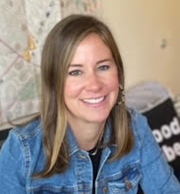
Leadership Letter: Put It on the Line
By Jen Dodson | November 2021
 As school counselors, one of our defining characteristics is that of an advocate. We advocate for our students to have opportunities, access and their needs met, both inside and outside of the classroom. One of those needs is to have a learning environment that is identity affirming, where they feel welcomed, included and respected. Yet we don’t have to look far to see how our students of color are treated in our communities and at school. With disproportionate numbers of Black and brown students suspended from school and disproportionate numbers of white students in honors and AP courses, it is clear that school is not a place where all students have the same opportunities to learn. Racism and bias are at play.
As school counselors, one of our defining characteristics is that of an advocate. We advocate for our students to have opportunities, access and their needs met, both inside and outside of the classroom. One of those needs is to have a learning environment that is identity affirming, where they feel welcomed, included and respected. Yet we don’t have to look far to see how our students of color are treated in our communities and at school. With disproportionate numbers of Black and brown students suspended from school and disproportionate numbers of white students in honors and AP courses, it is clear that school is not a place where all students have the same opportunities to learn. Racism and bias are at play.If you still aren’t sure of your role when it comes to racial justice in your school, look no further than the ASCA Ethical Standards or the ASCA Professional Standards and Competencies. ASCA’s position is clear: “School counselors have a unique opportunity to be an important part of the solution. Through implementation of a school counseling program, school counselors promote equity and access for all students and make a significant impact on creating a school culture free from racism and bias” (ASCA Standards in Practice). But beyond noticing the disproportionalities or helping a student process an incident in which they were hurt at the hands of bias or racism, what more can school counselors do?
- We must name inequities when we see them.
- We must be leaders in our schools, willing to engage in difficult conversations, centering the voices of our Black and Latinx colleagues and students.
- We must step up to create systemic change.
- We must look in the mirror and reflect on our own practices to ask how we might be contributing to these inequities.
The education system in America has a long history of racism and bias. Progress has been made, but there is so much yet to do, and school counselors are uniquely positioned to impact change. So I must ask: What are you putting on the line for your students? How are you using your privilege to do right by them? How are you helping to dismantle systems that do not benefit all students in your school?
Contact Jen Dodson, assistant chair of the ISCA Board, at dodson.jenniferj@gmail.com.